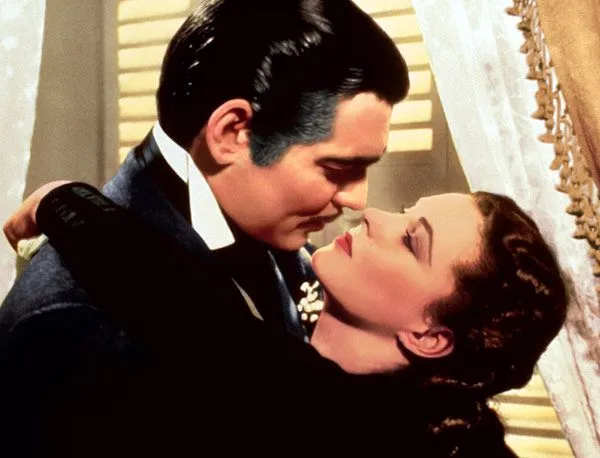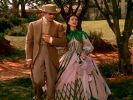Eye For Film >> Movies >> Gone With The Wind (1939) Film Review
Gone With The Wind
Reviewed by: Jennie Kermode

There have been few more spectacular, brazenly indulgent romantic melodramas than Gone With The Wind in the whole of cinematic history. Wide-eyed, elaborately dressed Scarlett O'Hara is a Southern belle like no other, but she's far from the fragile creature she appears to be. Everything about her is performance, to the point where she eventually begins to doubt herself. This passion that has echoed through so many films since - was it ever any more real than the grateful smiles of the enslaved people who provide the backdrop to her extravagance?
It's 1861, and Scarlett watches the man she loves marry someone else - someone less challenging. Soon settling into a marriage of convenience herself, she is widowed by the unfolding war, and during her struggle to survive becomes caught up with Clark Gable's troubled Rhett Butler. There seems briefly to be a real possibility of romance, but the stormy personalities on which their chemistry hinges make their relationship increasingly tumultuous. With Scarlett convincing herself that she cannot forget her first love, it can only end in destruction.

So far, so melodramatic. What makes Gone With The Wind more interesting - aside from its stunning visual realisation - is the complexity underlying the principal characters. Though this is poorly developed in the script, all the principal actors deliver. Gable seems willing to acknowledge the ugly side of Rhett even where the film glosses over it towards the end. Olivia De Havilland brings depth and humanity to the heroine's vulnerable rival. Leigh herself embraces the artificiality of Scarlett, all the more potent in light of her subsequent diagnosis with tuberculosis (those kisses may have been genuinely dangerous) and the fact that she was herself struggling to find the strength to perform. Beneath the endless rhetoric of romance and duty and the horrors of war, Scarlett is a woman adrift, trying to find her own direction in a world that no longer has room for the creature it taught her to be. Foreshadowing Leigh's Blanche Dubois in A Streetcar Named Desire, she rages against her helplessness even whilst playing it up to manipulate others - the only scrap of power she has ling in the beauty she knows will be all too short-lived.
Too clumsy a thing to be taken seriously, with its romanticisation of slavery and its problematic approach to rape, Gone With The Wind is nevertheless a work of considerable power. It may never quite catch fire but it smoulders effectively for a long time, just about sustaining its pace even over its substantial running time. It is a film that genuinely deserves the label epic, too lightly applied these days, and it is without doubt the most ambitious of its era. It's also a film that deserves to be seen on the big screen.
Reviewed on: 15 Nov 2013

















